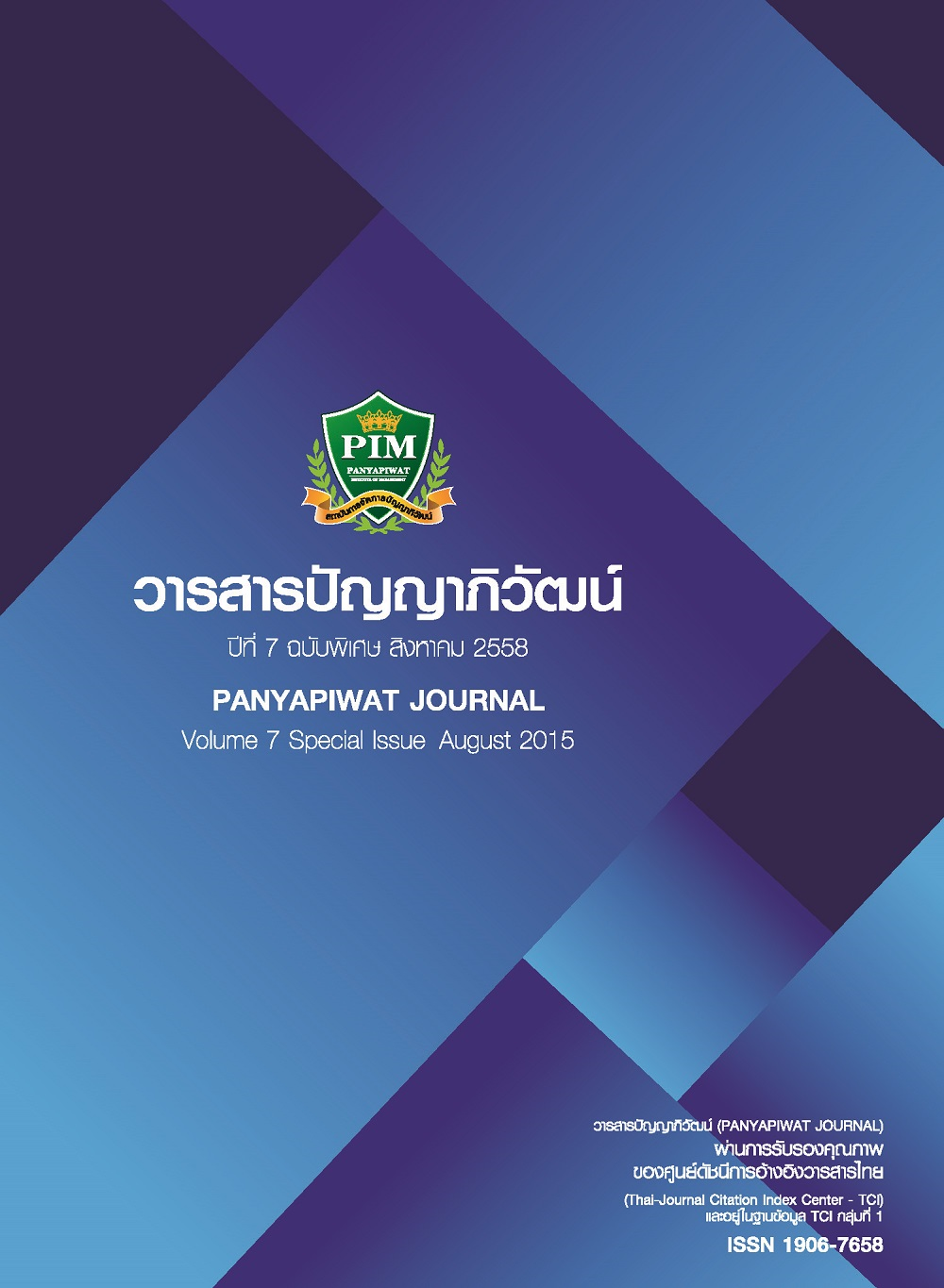ความสัมพันธ์ระหว่างการรับรู้การสนับสนุนจากองค์กร บรรยากาศองค์กร กับพฤติกรรมการเป็นสมาชิกที่ดีขององค์กรของคณาจารย์ต่างเจนเนอเรชั่น ในมหาวิทยาลัยราชภัฏอุบลราชธานี
Main Article Content
บทคัดย่อ
บทคัดย่อ
การวิจัยครั้งนี้มีความมุ่งหมายเพื่อศึกษาความสัมพันธ์ระหว่างการรับรู้การสนับสนุนจากองค์กร บรรยากาศองค์กรของคณาจารย์ต่างเจนเนอเรชั่นกับพฤติกรรมการเป็นสมาชิกที่ดีขององค์กร กลุ่มตัวอย่าง คือ คณาจารย์ในมหาวิทยาลัยราชภัฏอุบลราชธานี จำนวนทั้งสิ้น 246 คน สถิติที่ใช้ในการวิเคราะห์ข้อมูล ได้แก่ ค่าร้อยละ ค่าเฉลี่ย ส่วนเบี่ยงเบนมาตรฐาน การวิเคราะห์ค่าสัมประสิทธิ์สหสัมพันธ์แบบเพียร์สัน และการวิเคราะห์การถดถอยพหุคูณ ผลการวิจัยพบว่า การรับรู้การสนับสนุนจากองค์กรของคณาจารย์ต่างเจนเนอเรชั่น โดยรวมมีความสัมพันธ์ทางบวกกับพฤติกรรมการเป็นสมาชิกที่ดีขององค์กรอย่างมีนัยสำคัญทางสถิติมีค่าสัมประสิทธิ์สหสัมพันธ์เท่ากับ .699, .315 และ .225 การรับรู้บรรยากาศองค์กรของคณาจารย์ต่างเจนเนอเรชั่น โดยรวมมีความสัมพันธ์ทางบวกกับพฤติกรรมการเป็นสมาชิกที่ดีขององค์กรอย่างมีนัยสำคัญทางสถิติมีค่าสัมประสิทธิ์สหสัมพันธ์เท่ากับ .489, .328 และ .189 การรับรู้การสนับสนุนจากองค์กรด้านการปฏิบัติงานและด้านผลตอบแทน สามารถร่วมกันทำนายพฤติกรรมการเป็นสมาชิกที่ดีขององค์กรได้ร้อยละ 9 การรับรู้บรรยากาศองค์กรด้านนโยบายและแนวทางปฏิบัติของฝ่ายบริหาร และด้านโครงสร้างองค์กร สามารถร่วมกันทำนายพฤติกรรมการเป็นสมาชิกที่ดีขององค์กรได้ร้อยละ 8
This purposes of this study were to investigate the relation between organizational support and organizational climate and organizational citizenship behavior of lecturers generation differences in Ubon Ratchathani Rajabhat University. The population was overall lecturers performing 246 samples. The data was analyzed by percentage, mean, standard deviation, Pearson’s product moment correlation coefficient, and Stepwise Multiple Regression Analysis. The findings were: The finding revealed that the overall level of lecturers’ perception to organizational citizenship behavior was positive significant with correlation efficient .699, .315, .225. Among generation’s perception toward organizational climate on the aspect of organizational citizenship was positive significant with correlation efficient .489, .328, .189. Factor of organization support revealed that effective variables of this factor were the perception of work performance and reward. Both variables were presumptive of organizational citizenship behavior 9%. Factor of organizational climate was found that effective variables of behavior of organizational citizenship involved the perception of organizational structure and organizational climate on policy and work guidelines of administration department. Both variables were presumptive of organizational citizenship behavior 8%.
Article Details
“ข้าพเจ้าและผู้เขียนร่วม (ถ้ามี) ขอรับรองว่า บทความที่เสนอมานี้ยังไม่เคยได้รับการตีพิมพ์และไม่ได้อยู่ระหว่างกระบวนการพิจารณาลงตีพิมพ์ในวารสารหรือแหล่งเผยแพร่อื่นใด ข้าพเจ้าและผู้เขียนร่วมยอมรับหลักเกณฑ์การพิจารณาต้นฉบับ ทั้งยินยอมให้กองบรรณาธิการมีสิทธิ์พิจารณาและตรวจแก้ต้นฉบับได้ตามที่เห็นสมควร พร้อมนี้ขอมอบลิขสิทธิ์บทความที่ได้รับการตีพิมพ์ให้แก่สถาบันการจัดการปัญญาภิวัฒน์หากมีการฟ้องร้องเรื่องการละเมิดลิขสิทธิ์เกี่ยวกับภาพ กราฟ ข้อความส่วนใดส่วนหนึ่งและ/หรือข้อคิดเห็นที่ปรากฏในบทความข้าพเจ้าและผู้เขียนร่วมยินยอมรับผิดชอบแต่เพียงฝ่ายเดียว”
เอกสารอ้างอิง
ทัศนา เจนวณิชสถาพร. (2553). ความสัมพันธ์ระหว่างการรับรู้การสนับสนุนจากองค์การ การมองโลกในแง่ดี และการรับรู้พฤติกรรมการเป็นสมาชิกที่ดีขององค์กร กรณีศึกษาหน่วยงานในกำกับของรัฐแห่งหนึ่ง. วิทยานิพนธ์ศิลปศาสตรมหาบัณฑิต, มหาวิทยาลัยธรรมศาสตร์.
ทิพนิภา ชื่นสกุล. (2550). ความสัมพันธ์ระหว่างลักษณะบุคลิกภาพตามแนวคิดของโควี กับการรับรู้การสนับสนุนจากองค์การ ต่อพฤติกรรมการทำงานของพนักงานในบริษัทธุรกิจโฆษณา. กรุงเทพฯ: มหาวิทยาลัยเทคโนโลยีพระจอมเกล้าพระนครเหนือ.
ธรรมรัตน์ อยู่พรต. (2556). ค่านิยมในการทำงานที่ส่งผลต่อพฤติกรรมการเป็นสมาชิกที่ดีขององค์กรของเจนเนอเรชั่นต่างๆ. วารสารบริหารธุรกิจ, 36(138), 40-62.
ยุวดี ศิริยทรัพย์. (2553). ความสัมพันธ์ระหว่างการรับรู้การสนับสนุนจากองค์การ ความยุติธรรมในองค์การ และพฤติกรรมการเป็นสมาชิกที่ดีขององค์การของบุคลากรมหาวิทยาลัยในกำกับของรัฐ กรณีศึกษา: มหาวิทยาลัยมหิดล. วิทยานิพนธ์การจัดการมหาบัณฑิต, มหาวิทยาลัยบูรพา.
เรืองวิทย์ เกษสุวรรณ. (2556). การพัฒนาองค์การ. กรุงเทพฯ: บพิธการพิมพ์.
ลินดา อัญญธนากร. (2550). ความสัมพันธ์ระหว่างการรับรู้วัฒนธรรมองค์การ บรรยากาศองค์การ และพฤติกรรมการทำงานตามบทบาทของข้าราชการตำรวจในสถานีตำรวจนครบาล. วิทยานิพนธ์ศิลปศาสตรมหาบัณฑิต, มหาวิทยาลัยธรรมศาสตร์.
Brow, S. P. & Leigh, T. W. (1996). A New Look at Psychological Climate and Its Relationship to Job Involvement, Effort, and Performance. Journal of Applied Psychology, 81, 358-368.
Eisenberger, R., Huntington, R., Hutchison, S. & Sowa, D. (1986). Perceived Organization Support. Journal of Applied Psychology, 71, 500-507.
Eisenberger, R., Armali, S., Rexwingle, B., Lynch, P. D. & Rhoades, L. (2001). Reciprocation of Perceived Organization Support. Journal of Applied Psychology, 86, 42-51.
Glass, A. (2007). Understanding generation differences for competitive success. Industrial and commercial training,2, 98-103.
Hofman, D. A. & Morgeson, F. P. (2003). Climate as a Moderator of the Relationship Between Leader-Member Exchange and Content Specific Citizenship: Safety Climate as an Exemplar. Journal of Applied Psychology, 88, 170-178.
Katz, D. & Kahn, R. L. (1978). The social psychology of organizations. (2nd ed.). New York: Wiley.
Litwin, G. & Stringer, R. (1968). Motivation and Organization Climate. Massachusett: Harvard University Press.
Organ, D. W. & Bateman, T. S. (1991). Organizational Behavior.(4th ed.). Homewood: Irwin.
Steers, R. M. & Porter, L. (1979). Motivation and Work Behavior. New York: McGraw–Hill.
Yamane, T. (1973). Statistics: An Introductory Analysis. New York: Harper and Row.
Zemke, R., Raines, C. & Filipczak, B. (2000). Generations at work Managing the Clash of Veterans, Boomers, Xers, and Nexters in Your Workplace. New York: Amacon.
Translated Thai References
Anyathanakorn, L. (2007). Relationships between perceptions of organizational culture, organizational climate and work role behavior of the police officers at the police stations under the Metropolitan Police Division. Research of Master of Arts Degree, Thammasat University. [in Thai]
Chuensakul, T. (2007). Relationship between Covey’s Concept of Personality and Perceived Organizational Support and Work Behaviors of in Advertising Business Employees.Bangkok: King Mongkut’s University of Technology North Bangkok. [in Thai]
Janwanishstaporn, T. (2010). The Relationship between Perceived Organizational Support, Optimism and Perceived Organizational Citizenship Behavior: A Case Study of A public Organization. Research of Master of Arts Degree, Thammasat University. [in Thai]
Ketsuwan, R. (2013). Organizational Development. Bangkok: Bopit Printing. [in Thai]
Siriyasub, Y. (2010). Relationships Among Perceived Organizational Support, Organizational Justice, and Organizational Citizenship Behaviour: A Case Study of Mahidol University. Research of Master of Management Program, Burapha University. [in Thai]
Yuprot, T. (2013). Effect of Work Values on Organizational Citizenship Behavior among the Generations.Journal of Business Administration, 36(138), 40-62. [in Thai]


